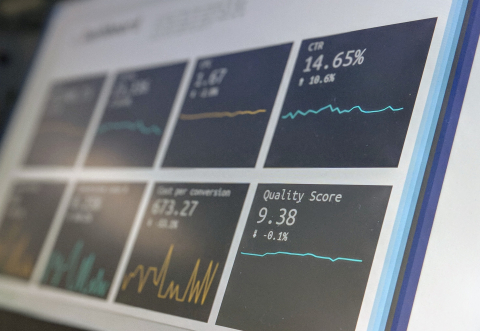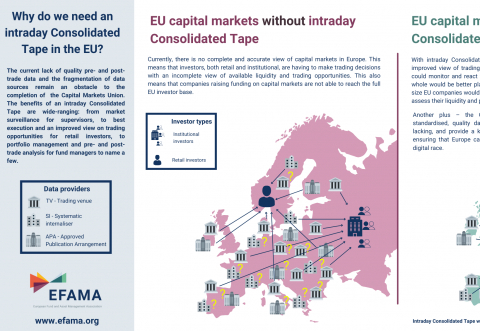EFAMA supports the European Commission's initiative to establish the European Single Access Point. We see it as a unique opportunity for the Capital Markets Union to centralise all publicly available ESG and financial transparency information data in one place.
Data
In the modern economy, data is increasingly becoming a strategic asset. This is particularly true for the asset management industry, where data forms the backbone of the daily activities and internal processes necessary to guarantee best practices in portfolio management.
Asset managers are major users of a variety of data, including market data, index data and, increasingly, ESG data. EFAMA advocates for, and seeks to support members’ access to, high-quality, standardised and comparable data at a fair price. EFAMA also encourages the creation of a well-structured, reasonably priced consolidated tape fed by all trading venues and systematic internalisers for all financial instruments.
EFAMA response to Commission consultation on establishment of European Single Access Point (ESAP)
EFAMA responds to IOSCO Consultation on Market Data in Secondary Equity Market
EFAMA supports the initiatives launched by IOSCO and other regulators (e.g. ESMA, FCA, SEC) to analyse and address the significant issues concerning market data in the secondary equity market.
EFAMA's reply to ESMA's CP on the Guidelines on the MiFID II / MiFIR Obligations on Market Data
EFAMA welcomes this ESMA initiative and we agree with the conclusions in the ESMA Report that there is an overall need to strengthen the laws applicable to data in connection with the MiFIDII/MiFIR Review, aside the implementation of a Consolidated Tape . We consider that the draft Guidelines will further strengthen the MiFID level 1 and level 2 measures and will foster the establishment of a cost-based approach for market data procurement. Therefore, we would be in favour of turning the proposed guidelines into binding regulation.
Key recommendations for fair benchmark data costs - EFAMA/ICSA Global Memo on Benchmark Data Costs
EFAMA (European Fund of Asset Management Associations) and ICSA (International Council of Securities Association) published today a Global Memo on Benchmark Data Costs, identifying the main challenges arising from the increased use of benchmark data over recent decades and the imposition of increasingly complex and ove
European single access point for data? EFAMA’s 6 key recommendations
The European Fund and Asset Management Association (EFAMA) has published its response to the European Commission's consultation on the establishment of a European Single Access Point (ESAP) for financial and non-financial information publicly disclosed by companies.
Monthly Statistics December 2020 | UCITS and AIF ended 2020 with record net sales in December
The European Fund and Asset Management Association (EFAMA) has published its Investment Fund Industry Fact Sheet for December together with an overview of the net sales data for UCITS and AIFs in 2020.
Thomas Tilley, Senior Economist, commented on the December figures: “Net sales of UCITS and AIFs surged to an absolute record in December 2020, as investor confidence in a successful exit from the Covid-19 crisis continued to strengthen.”
The main developments in December are as follows:
Asset Management Report 2021
This is our 13th edition of the Asset Management in Europe report, which provides an in-depth analysis of recent trends in the European asset management industry, focussing on where investment funds and discretionary mandates are managed in Europe.
Visual | Why do we need a real-time Consolidated Tape in the EU?
The current lack of quality pre- and post-trade data and the fragmentation of data sources remain an obstacle to the completion of the Capital Markets Union. The benefits of a real-time Consolidated Tape are wide-ranging: from market surveillance for supervisors, to best execution and an improved view on trading opportunities for retail investors, to portfolio management and pre- and post-trade analysis for fund managers to name a few.
Global Memo: Benchmark Data Costs
A key purpose of the financial system is to allocate capital and risk in a manner that supports sustainable economic development and growth, including through the provision of financing, investment and hedging products. Financial benchmarks/indices are fundamental to the functioning of financial markets and are widely used in both retail and wholesale markets. In particular, benchmarks are a valuable tool helping market participants to set prices, measure performances, or work out amounts payable under financial contracts or instruments.
































